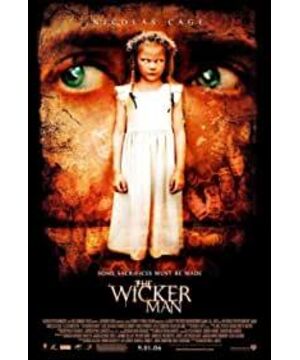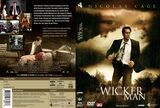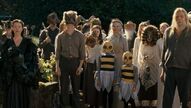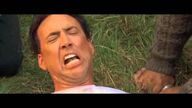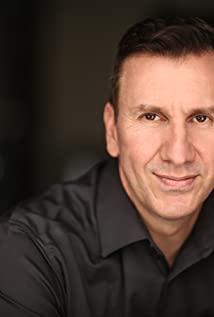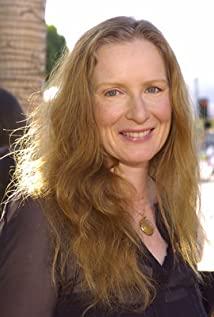No matter what kind of religion, at the beginning of its establishment, it always embodies the best expectations and purest beliefs of the world. They have built a peaceful and bright world on the other side, tempting the world to be full of hope and tirelessly pursue. To a large extent, the magic of religion stems from the magic of these hopes. But in the movie "The Wicker Man", which is as gentle as a British gentleman and even accompanied by a little joy, when the peaceful and beautiful world on the other side fell into the dust and was peeled away like a cocoon, we only felt that there was a mixed The coldness of fear and despair slowly crept into my heart, which was startling.
The movie "The Wicker Man" has another name, "The Pagan", so who is this pagan? In the eyes of the male protagonist, Officer Howie, the heretics are of course the Xia Dao people headed by Lord Xia Dao, because they unscrupulously promote the idea of sexual intercourse and reproduction; because they do not believe in Jesus but believe in the sun god, fire god and other ancient times God; for they called the great Son Jesus "the Son of Ghosts." Every time Howie gets pissed off by the customs and beliefs of the Summer Islanders, there's a sense of ludicrousness. This ridiculousness is not just because of Howie's words and deeds, but the ridiculousness of the Christianity he believes in revealed from his words and deeds.
When Lord Summer Island was telling Howie about their religion, Howie was so angry that he shouted to Lord Summer Island: "He made you a heretic." The word heretics is a Christian word with a Words with profound demeaning and discriminatory connotations, Howie, a devout Christian, always had a kind of offended anger when faced with the reality that the Xia Dao people did not believe in Jesus, and this anger itself was actually mixed with a A natural sense of superiority. And isn't this demeaning of the pagans, this natural sense of superiority, in contrast to the love and justice that Christians are constantly talking about. Howie always judged the Xia Dao people by Christian dogma and regarded them as heretics. What he didn't know was that in the Xia Dao people's eyes, he was the heathen to be slaughtered. He sees himself as a defender of justice and faith, but he doesn't know that his anger and his persistence are like the ignorant struggle of animals before they die. It is not a mistake for him as a Christian, but it is a sad and ridiculous thing that he thinks of his religious belief as the most noble and sacred thing that can surpass all other beliefs in the world. When he was about to be executed, Howie shouted to everyone: "There is no Son of the Sun, there is no Saturn, and your crops are not harvested because of circumstances." While observing the religious beliefs of others, he restored science and reason. , but why before he died, he was still so frightened that he cried out to Jesus for help. If God really exists, why didn't God listen to his call and save him from the raging fire for a devout believer like him. Howie was a typical traditional devout and upright Christian, but it was this piety and uprightness that pushed him into the flame of death; it was his unwavering love and admiration for God that made him In the eyes of Xia Dao people, it is worthy of being "the most precious gift to God". Isn't the direction and ending of this fate more like an absurd and cruel trick God has performed on his believers?
And when we turn our pondering eyes to the Xia Dao people, a hidden sense of cruelty is even more chilling. Many people say that this movie is one of the most impressive thrillers they have ever seen. In fact, this movie does not set many depressing and eerie tones and some convoluted horror or gore like ordinary thrillers. But at the end of the film, when we watch Howie screaming among the burning wicker people, when we watch the Summer Islanders sing with pride and hope while listening to Howie screaming and holding hands , we do let out a terrified exclamation when we realize that the entire movie is actually about a conspiracy to hunt down sacrifices. The origin of Xia Dao people's belief is that Lord Xia Dao's grandfather understood that the best way to reclaim the remote and desolate Xia Dao is to "awaken people from indifference, make them still believe that the gods still exist, and believe in gods. You will be blessed." Only by arousing everyone's passion for life through faith, will everyone be willing to work hard, and Xia Island may become "a land that bears rich fruits". At the beginning of its creation, this belief was a utilitarian deception. And although this belief leads people out of indifference, it also pushes them to a more upright cruelty. Just because of their religious beliefs, they can arbitrarily regard people as animals, just offering sacrifices to gods; just because of their religious beliefs, they can completely ignore the blood on their hands, even the blood on their hands. Think of it as a symbol of glory. But if the next year still does not bear fruit, will this bloody sacrifice continue? Countless lives died innocently, just to cover up the obvious lies of faith with blood, and use the body to support the dignity of faith that is at stake. Faith not only did not bring everyone to the other side of love and kindness, but instead pushed them into the abyss of ignorance and paranoia. This is the case with the people of Xia Dao and Officer Howie.
Throughout the film, a confrontation has been staged, both between Officer Howie and the Summer Islanders, and between the two religious beliefs they represent. When we look back on the history of the development and expansion of any religious school, we will find that this confrontation is not accidental or film fiction, but just accompanied by the development of religion from beginning to end. At the beginning of the eleventh century, the centuries-long crusades allowed by the Catholic Pope led to the destruction of life in Europe and Muslim countries; in the sixteenth century, the religious reform movement in the name of the dispute between the old and the new caused the whole of Europe to fall into chaos; the Renaissance Bruno, the great warrior, was regarded by the church as a "heretic" because he encouraged freedom movement and heliocentrism, and was burned to death in the square of flowers; even today, the Islamic world is still in constant scuffle and misery due to religious differences; when extremist terrorists are killing innocent people, they hold high It is also the banner of "Holy War"...
Religion is a beam of light from heaven, but when the light shines on the world, shadows follow. The truth, goodness and beauty of religion has become a golden fig leaf. While singing the praises of God's love for the world, the believers raised their butcher knives to expedition to the east and west. The cold light of the butcher's knife reflects the struggle for power, the greed of human nature and the lonely place of human destiny.
View more about The Wicker Man reviews


